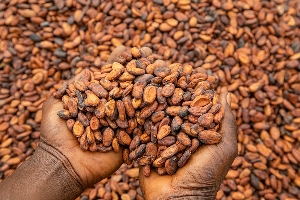The domestic cocoa industry is witnessing encouraging results from ongoing reforms aimed at enhancing efficiency and financial viability, according to Dr. Alhassan Iddrisu, Director-Economic Strategy and Research Division, Ministry of Finance.
Speaking at the Inaugural Quarterly Economic Roundtable, Dr. Iddrisu highlighted collaborative efforts between the Ministry of Finance and Ministry of Food and Agriculture to revitalise the Ghana Cocoa Board (COCOBOD). “We are working together to ensure that COCOBOD is put on the radar and being monitored to be certain we improve its operational efficiency and financial viability,” he stated.
One of the key reforms showing positive outcomes is COCOBOD’s phasing out of road construction activities. Dr. Iddrisu explained, “COCOBOD is phasing out its road construction. The consensus is that there’s a Ministry of Roads and the ministry is a better place to do some roads than COCOBOD itself”.
This shift has already led to significant cost reductions, with Dr. Iddrisu noting: “The huge COCOBOD Roads expenditures that were hitting the books of COCOBOD have been rationalised and reduced significantly”.
Another promising reform involves changes to the producer price determination mechanism. The new system, based on FOB prices, aims to reduce shocks to COCOBOD’s finances by reflecting global price volatilities more accurately. “That’s the way to go, so when there are volatilities in the prices they are reflected immediately into the pricing regime – reducing any shock to the books of COCOBOD,” Dr. Iddrisu explained.
The Ministry of Finance is also strengthening its oversight of COCOBOD, a move that Dr. Iddrisu believes will further improve the institution’s financial management.
These positive developments align with the International Monetary Fund’s (IMF) US$3billion Extended Credit Facility programme for Ghana. Stéphane Roudet, the IMF Mission Chief for Ghana, recently expressed satisfaction with the country’s implementation of reforms in the cocoa sector. “We understand that government and COCOBOD are committed to ensuring their activities, such as quasi-fiscal activities, are being curtailed and kept within an envelope which ensures their finances are sustainable,” Mr. Roudet stated.
As Ghana – the world’s second-largest cocoa producer – continues to implement these reforms, early signs of success are encouraging. The rationalisation of expenditures, improved pricing mechanisms and enhanced financial oversight are all positive indicators that COCOBOD is on the right track toward achieving greater efficiency and financial stability.
These reforms are expected to have far-reaching impacts on Ghana’s cocoa industry, potentially reshaping the landscape of cocoa production in West Africa.
Business News of Wednesday, 3 July 2024
Source: thebftonline.com













